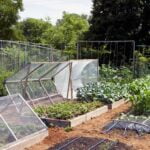If you have a vegetable garden, you have likely encountered the frustrations of squirrels nibbling away at your precious crops. This is where homemade squirrel repellent comes to the rescue.
In this article, we will explore the importance of utilizing homemade squirrel repellents in vegetable gardens and understand the damage that these critters can cause to plants and overall garden health. We will also delve into why choosing natural and homemade repellents over chemical alternatives is not only better for the environment but also more effective in keeping these furry intruders at bay.
Squirrels can wreak havoc on vegetable gardens, making it essential to find ways to deter them from feasting on your hard work. They are notorious for digging up newly planted seeds, gnawing on vegetables, and munching on fruits and flowers.
Their presence not only leads to stunted growth and decreased yield but can also attract other pests that feed on damaged plants. By using homemade squirrel repellents, you can protect your plants from these furry invaders without resorting to harmful chemicals that may have adverse effects on both your garden and the environment.
When it comes to choosing a squirrel repellent for your vegetable garden, opting for natural and homemade solutions offers numerous benefits. Firstly, they are typically made with ingredients that are readily available in most households, making them convenient options.
Additionally, natural repellents are safer for consumption as they do not contain harmful toxins that could be ingested by humans or animals consuming your produce. Moreover, homemade squirrel repellents can be just as effective as chemical alternatives when used correctly and consistently.
In the following sections of this article, we will explore various recipes for effective homemade squirrel repellents using common household items such as cayenne pepper, garlic, vinegar, hot sauce, peppermint oil, and dish soap. We will also provide tips and tricks for applying these repellents effectively in your vegetable garden along with additional measures you can take to control squirrels. So, stay tuned and get ready to defend your vegetable garden against these persistent little creatures.
Understanding the damage squirrels cause to vegetable gardens
Squirrels can wreak havoc on vegetable gardens by causing extensive damage to plants and negatively impacting garden health. Understanding the specific ways in which squirrels can harm your garden is essential for implementing effective control measures.
One of the most common forms of damage caused by squirrels is the nibbling and eating of plant leaves, fruits, and vegetables. Squirrels are notorious for their love of ripe tomatoes, cucumbers, and corn, among other garden favorites. This constant feeding can result in significant loss of crop yield and even lead to complete destruction of certain plants.
In addition to directly consuming crops, squirrels also have a habit of digging up newly planted seeds or bulbs. They are attracted to the scent and texture of freshly turned soil, making it difficult for seeds to take root and grow. This can be particularly problematic for plants with longer germination periods or those that rely on direct sowing.
Beyond their feeding habits, squirrels can also cause indirect damage to the overall health of your vegetable garden. They may create tunnels or burrows in the soil, disrupting root systems and compromising stability. These tunnels can also become entry points for other pests or diseases that can further harm your plants.
Given the extensive damage that squirrels can cause in vegetable gardens, it is crucial to take proactive steps to protect your plants. By understanding the impact these animals have on both individual plants and overall garden health, you can better appreciate the need for effective squirrel repellents and other control measures.
- Nibbling and eating of plant leaves, fruits, and vegetables
- Digging up newly planted seeds or bulbs
- Disrupting root systems through tunneling
- Compromising stability by creating tunnels or burrows
- Becoming entry points for other pests or diseases
The importance of choosing natural and homemade repellents over chemical alternatives
Using natural and homemade repellents for squirrel control in vegetable gardens is not only a safe and eco-friendly option but also highly effective. Chemical alternatives may promise quicker results, but they can pose risks to both the environment and your health. Choosing natural repellents ensures the well-being of your plants, animals, and yourself.
One of the main reasons to opt for natural repellents is that they are safe for your vegetable garden. Chemical pesticides can contaminate the soil and plants, potentially harming beneficial insects and other organisms that help maintain a balanced ecosystem.
On the other hand, homemade squirrel repellents are made from ingredients found in your own kitchen, such as cayenne pepper, garlic, vinegar, hot sauce, peppermint oil, and dish soap. These ingredients act as natural deterrents without causing harm to the environment or compromising the quality of your vegetables.
In addition to being safe for the environment, homemade squirrel repellents are also safe for you and your family. Chemical alternatives often contain toxic substances that can be harmful if ingested or absorbed through the skin. By choosing natural repellents, you eliminate these health risks while still effectively protecting your garden from squirrel damage. You can have peace of mind knowing that you are creating a healthy and sustainable environment for both plants and people.
When it comes to natural squirrel repellents, there are numerous options available using common household items. Cayenne pepper is a popular ingredient due to its spicy nature, which squirrels find unpleasant. Garlic acts as another effective deterrent with its strong odor.
Vinegar is known for its strong scent and taste that repels many pests including squirrels. Other options include using hot sauce or peppermint oil – both of these have potent smells that discourage squirrels from coming near your garden. Adding a few drops of dish soap helps these ingredients spread evenly on plant surfaces.
By opting for homemade squirrel repellents over chemical alternatives, you can ensure a safe and healthy environment for your vegetable garden. These natural repellents not only effectively deter squirrels but also provide peace of mind in terms of environmental impact and personal health and safety. With a variety of household ingredients at your disposal, you can easily create effective homemade squirrel repellents that will protect your precious vegetables from these furry intruders.
Key ingredients for effective homemade squirrel repellents
To create an effective homemade squirrel repellent for your vegetable garden, it is important to understand the key ingredients that can be used. By using common household items, you can deter squirrels from damaging your plants and ensure a healthy garden.
Cayenne Pepper
One of the most effective ingredients in homemade squirrel repellents is cayenne pepper. Squirrels are repelled by its strong and spicy scent. You can easily make a spray repellent using cayenne pepper by mixing one tablespoon of cayenne pepper powder with one cup of water and a few drops of dish soap. This mixture can then be sprayed onto the leaves, stems, and surrounding areas of your vegetable plants.
Garlic
Garlic is another household item that can be used to deter squirrels from your vegetable garden. Squirrels dislike the pungent smell of garlic, making it an effective deterrent. You can crush garlic cloves and mix them with water to create a spray repellent or place crushed garlic around the base of your plants. Alternatively, you can also use garlic powder to sprinkle around your garden as a barrier against squirrels.
Vinegar
Vinegar is not only a versatile ingredient in cooking but also a useful tool in squirrel control for vegetable gardens. Its strong odor is disliked by squirrels, making them avoid areas where vinegar is present. You can create a vinegar spray by mixing equal parts of vinegar and water in a spray bottle. This mixture can be applied directly to plant foliage or on the ground around your vegetables.
By incorporating these common household items into your homemade squirrel repellent formulations, you can effectively protect your vegetable garden from squirrel damage without resorting to chemicals.
Not only are these ingredients readily available, but they are also natural and safe for both humans and animals. Homemade squirrel repellents provide an eco-friendly alternative to chemical solutions, ensuring the health and well-being of your garden.
Recipe #1
Making your own squirrel repellent can be a cost-effective and efficient way to protect your vegetable garden from these pesky creatures. One effective recipe involves using ingredients commonly found in households such as cayenne pepper, garlic, and vinegar. Here is a step-by-step guide on how to make this homemade squirrel repellent:
Step 1: Gather the necessary ingredients:
- 2 tablespoons of cayenne pepper.
- 2 tablespoons of minced garlic.
- 1 tablespoon of dish soap.
- 1 cup of white vinegar.
- 5 cups of water.
Step 2: Mix the repellent solution:
In a large container or spray bottle, combine the cayenne pepper, minced garlic, dish soap, white vinegar, and water. Stir the mixture thoroughly to ensure that all the ingredients are well combined.
Step 3: Let it steep:
Allow the mixture to steep for approximately one hour. This will help enhance its potency by allowing the flavors from the garlic and peppers to infuse into the liquid.
Step 4: Strain and transfer:
After an hour has passed, strain the mixture through a fine mesh sieve or cheesecloth to remove any solid particles. Transfer the strained liquid into a spray bottle for easy application in your vegetable garden.
Step 5: Apply the repellent:
When applying the homemade squirrel repellent, focus on treating areas where squirrels are known to be active or areas where they frequently damage plants. Spray the solution generously across your plants, paying close attention to areas like leaves and stems that squirrels often target.
| Ingredients | Amount |
|---|---|
| Cayenne pepper | 2 tablespoons |
| Minced garlic | 2 tablespoons |
| Dish soap | 1 tablespoon |
| White vinegar | 1 cup |
| Water | 5 cups |
It is important to note that this homemade squirrel repellent has a strong odor due to the use of garlic and cayenne pepper. While squirrels are deterred by these scents, other animals may also be affected. Therefore, it is essential to use this homemade remedy with caution and consider the potential impact on beneficial insects or pets.
By following this simple recipe and applying the homemade squirrel repellent strategically in your vegetable garden, you can effectively protect your plants from squirrel damage and enjoy a bountiful harvest.
Recipe #2
For those who prefer to explore alternative options for homemade squirrel repellents, Recipe #2 offers another effective solution using hot sauce, peppermint oil, and dish soap. This recipe is simple to make and utilizes the strong scents of hot sauce and peppermint oil to deter squirrels from your vegetable garden.
Ingredients
- 1 cup of water.
- 1 tablespoon of hot sauce.
- 1 tablespoon of peppermint oil.
- 1 teaspoon of dish soap.
Instructions
- In a spray bottle or container with a lid, combine the water and dish soap. Stir gently until the soap is dissolved.
- Add the hot sauce and peppermint oil to the mixture.
- Secure the lid tightly on the container or close the spray bottle.
- Shake well to ensure all ingredients are thoroughly mixed.
Application
When applying this DIY squirrel repellent, it is essential to keep in mind that squirrel activity may vary from garden to garden. Here are some tips for effective application:
- Identify areas where squirrels frequently visit or cause damage in your garden. Focus on these specific locations when applying the repellent.
- Spray the mixture directly onto plants, particularly around the base and lower leaves where squirrels are more likely to nibble.
- Reapply the repellent after rain or heavy watering as it may wash away over time.
- Apply the repellent early in the morning or late in the evening when squirrels are most active.
It is important to note that while this DIY squirrel repellent can be highly effective, it may need to be reapplied regularly for optimal results. Additionally, remember to test a small area of your plants before applying it fully as certain plant varieties may react differently to the ingredients.
Using this alternative recipe, you can create a natural repellent that is safe for both your vegetable garden and the environment. By harnessing the scents of hot sauce and peppermint oil, you can effectively deter squirrels away from your plants and protect your harvest.
Tips and tricks for applying homemade squirrel repellent effectively
Applying homemade squirrel repellent effectively is crucial in protecting your vegetable garden from these furry intruders. By understanding where and how to apply the repellent, the frequency of application, and strategic placement, you can maximize its effectiveness and keep squirrels away from your precious plants.
Firstly, it is important to identify the areas in your garden that are most susceptible to squirrel damage. These include areas near bird feeders, fruit trees, and the entrance points to your garden. Squirrels are excellent climbers, so be sure to inspect your fences for any gaps or weaknesses that they could exploit. Once you have identified these areas, you can focus your efforts on applying the homemade squirrel repellent there.
When applying the repellent, make sure to follow the recipe instructions carefully. This will ensure that you have the right concentration of ingredients for maximum effectiveness. Spray or sprinkle the repellent directly onto plants or surfaces that squirrels may target, such as seedlings, flowers, or fruits. Pay extra attention to any areas where squirrels have previously caused damage or show signs of activity.
The frequency of application will depend on various factors such as weather conditions and the severity of squirrel infestation in your area. Generally, it is recommended to reapply the homemade squirrel repellent every two weeks or after heavy rainfall. However, if you notice signs of squirrel activity despite regular application, you may need to increase the frequency of application.
Strategic placement of homemade squirrel repellents can also enhance their effectiveness. Consider placing deterrents near entrances to your garden or along potential routes squirrels might use to access your plants. Additionally, using a combination of different repellents in multiple locations can provide a more comprehensive defense against squirrels.
| Repellent | Main Ingredients | Application Frequency |
|---|---|---|
| Recipe 1 | Cayenne pepper, garlic, vinegar | Every two weeks or after heavy rainfall |
| Recipe 2 | Hot sauce, peppermint oil, dish soap | Every two weeks or after heavy rainfall |
Additional measures for squirrel control in vegetable gardens
When it comes to protecting vegetable gardens from squirrels, homemade repellents can be an effective first line of defense. However, there are additional measures you can take to further enhance squirrel control and protect your plants. These measures go beyond the use of homemade repellents and provide a more comprehensive approach to keep squirrels at bay.
One important step to consider is creating physical barriers around your garden. This can be done by installing fences or netting that prevents squirrels from accessing your plants. Fences should be at least 3 feet high and buried partially underground to prevent squirrels from burrowing underneath them. Netting should be stretched tightly over the garden bed, ensuring there are no gaps or holes for squirrels to squeeze through.
Another effective measure is providing distractions for squirrels away from your vegetable garden. Creating a separate area in your yard with squirrel-friendly plants and food sources will help divert their attention away from your precious vegetables. Consider planting sunflowers, corn, or other crops that squirrels find appealing, but won’t harm your own garden harvest.
In addition to physical barriers and distractions, it’s important to regularly inspect your garden for any signs of squirrel activity. Watch out for areas where they may have dug up or eaten vegetables, as well as signs of nibbling on leaves or stems. By catching these signs early on, you can take immediate action and reinforce your repellent methods or try new techniques if necessary.
Implementing these additional measures for squirrel control in your vegetable garden will help complement the effectiveness of homemade repellents. With a combination of physical barriers, distractions, and regular monitoring, you’ll have a better chance of keeping those pesky squirrels away from your beloved plants and enjoying a bountiful harvest year after year.
Frequently Asked Questions about homemade squirrel repellents for vegetable gardens
In conclusion, homemade squirrel repellents for vegetable gardens are essential for protecting your plants from the damaging effects of these critters. By understanding the impact squirrels can have on your garden and choosing natural and homemade alternatives over chemical options, you can ensure the health and productivity of your vegetables.
Throughout this article, we discussed key ingredients for effective homemade squirrel repellents, such as cayenne pepper, garlic, vinegar, hot sauce, peppermint oil, and dish soap. These common household items can be easily mixed together to create effective deterrents for squirrels.
We also provided two recipes and a step-by-step guide for making your own repellents. Whether you choose Recipe #1 with cayenne pepper or Recipe #2 with hot sauce, both options are safe, natural, and easy to make.
In addition to applying homemade squirrel repellent strategically in your garden, it is important to take additional measures for squirrel control. This may include installing fencing or netting around your garden beds or utilizing scare tactics such as motion-activated sprinklers or noise-making devices.
Finally, we addressed frequently asked questions about homemade squirrel repellents for vegetable gardens and provided expert answers. This information should help address any concerns or uncertainties you may have regarding the use of these repellents.
By following the advice provided in this article and implementing homemade squirrel repellents in your vegetable garden, you can protect your plants from these pesky critters while maintaining a healthy and productive garden.

If you’re looking to get into vegetable gardening, or are just looking for some tips on how to make your current garden better, then you’ve come to the right place! My name is Ethel and I have been gardening for years. In this blog, I’m going to share with you some of my best tips on how to create a successful vegetable garden.





